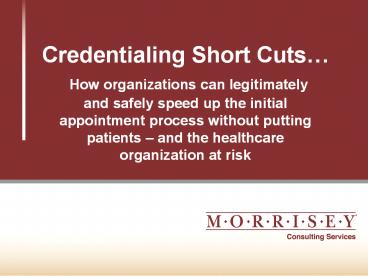Credentialing Short Cuts - PowerPoint PPT Presentation
1 / 22
Title:
Credentialing Short Cuts
Description:
Credentialing Short Cuts How organizations can legitimately and safely speed up the initial appointment process without putting patients and the healthcare – PowerPoint PPT presentation
Number of Views:75
Avg rating:3.0/5.0
Title: Credentialing Short Cuts
1
Credentialing Short Cuts How organizations can
legitimately and safely speed up the initial
appointment process without putting patients
and the healthcare organization at risk
Presented by Vicki L. Searcy, CPMSM Vice
President, Consulting Services Morrisey Associates
2
Utah Association Medical Staff ServicesAugust
13, 2010Presented byVicki L. Searcy,
CPMSMVice President, Consulting
ServicesMorrisey Associates(312)
784-5579vsearcy_at_morriseyonline.com
3
We Will Discuss
- How organizations can legitimately and safely
speed up the initial appointment process without
putting patients and the healthcare
organization at risk - Pre-application process
- Application process
- Documents that applicants are required to submit
- How to obtain a complete application
- Verifications
- What to verify and verification methods
- Accelerating the evaluation and decision-making
process - Elimination of idle time
4
Pre-Application Process
- Historic purpose
- Prior to implementation of National Practitioner
Data Bank - Process only applicants with real interest in
organization to avoid wasting time and money - Eliminate processing of applications that do not
meet organization requirements in order to avoid
denials - Current purpose?
- Pre-application vs. intended practice plan
5
Application Process
- Ask only for information that is
necessary/required and will be used - Copies of documents? Purpose?
- Licenses
- Diplomas
- Etc.
- CV
- Think about messages that are being sent to
practitioners about the credentialing process - If applicants are asked to sign documents when
they apply that wouldnt be necessary unless they
were appointed, are we sending a message that the
credentialing process is a mere formality?
6
- Verifications
7
The Basics
- The Application the data collection tool
- Complete professional history
- Request for clinical privileges
- Consent/Release/Attestation
8
Risk vs. Value vs. ROI
- WHAT GETS VERIFIED?
- Weve Always Done It That Way
- Risk Assessment
- Value to the Organization
- ROI staff time, wait time, supplies, etc.
9
Verified vs. Evaluated
- Verified
- Current Licensure
- Relevant Training
- What is Relevant
- What isnt
- Current Competence
- What is Current
10
Verified vs. Evaluated
- Evaluated The Joint Commission requirement
- Licensure
- Challenges to Licensure
- Relevant Training
- Peer/Faculty Recommendations
- Health Status Ability to Perform
11
Verified vs. Evaluated
- Evaluated TJC Requirement
- Data from Professional Performance, if available
- NPDB
- Evidence of Unusual Pattern or Excessive Number
of Professional Liability Actions Resulting in
Final Judgment - Voluntary/Involuntary (licensure, membership,
privileges)
12
Verified vs. Evaluated
- Verified and Evaluated Organization Specific
- Board Certification
- Criminal Background Check
- Claims History
- All Licenses (All states, current/previous)
13
Gaps
- Joint Commission Standard
- None
- NCQA Standard
- Work History (5 years) No Primary Source
Verification (PSV) - Gap - gt6 month to 1 year (verbal/written)
- Gap - gt 1 year (written)
14
Hospital Affiliations vs. Peer References
- Regulatory Standard Requirements Related to
Verification of Healthcare Organization
Affiliations - Hospital Affiliation Letter
- Name
- Dates of Affiliation
- Current Status
- Specialty
- Privileges
- Quality? Competence?
15
Hospital Affiliations vs. Peer References
- Peer Reference/Recommendation
- Peer
- Current Competency Evaluation
- Medical Clinical Knowledge, Technical Skills,
Clinical Judgment, Interpersonal Skills,
Communication Skills, Professionalism
16
Hospital Affiliations vs. Peer References
- Peer Reference/Recommendation
- Department Chair
- Medical Staff President/ VPMA/ Quality Chair
- Training Director
- Friends/Family???
17
Risk vs. Value vs. ROI
- Peer References (How Many)
- Gaps (How Long How Far Back)
- Hospital Affiliations (Current Previous - How
Far Back) - Claims History (How Far Back Where do you get
it) - All Current and Previous Licenses
18
Summary
- Review Current Practices
- Meet the requirements
- When your organization decides to exceed
requirements make sure that there is a return on
investment - Red Flags may precipitate verification of
additional information
19
Accelerating the Evaluation Process
- Elimination of idle time
- How much time is spent waiting for Department
Chairs to review a file, the Credentials
Committee meeting, the MEC meeting, etc.? - Is there a way to act more expeditiously on
files that are determined to be problem-free? - Does the Medical Executive Committee always need
to meet in person to take action on
problem-free credentialing decisions? Can they
meet more often than once a month?
20
Accelerating the Evaluation Process
- Temporary Privileges Pending Appointment
- Joint Commission sets the rules
- Accelerated Credentialing
- Organization-specific rules
- Expedited Credentialing
- Joint Commission allows the Board to have an
expedited decision-making process
21
In Conclusion
- Critically evaluate
- How you make applications and privilege
delineation forms available to applicants - Online applications and privileging is faster and
has other benefits - Critically evaluate what is being verified vs.
what is required and how the non-required
verifications benefit your organization by
assisting in making better decisions - Eliminate wasted time from the evaluation and
decision-making process - Streamline whenever possible and practical
22
QA































